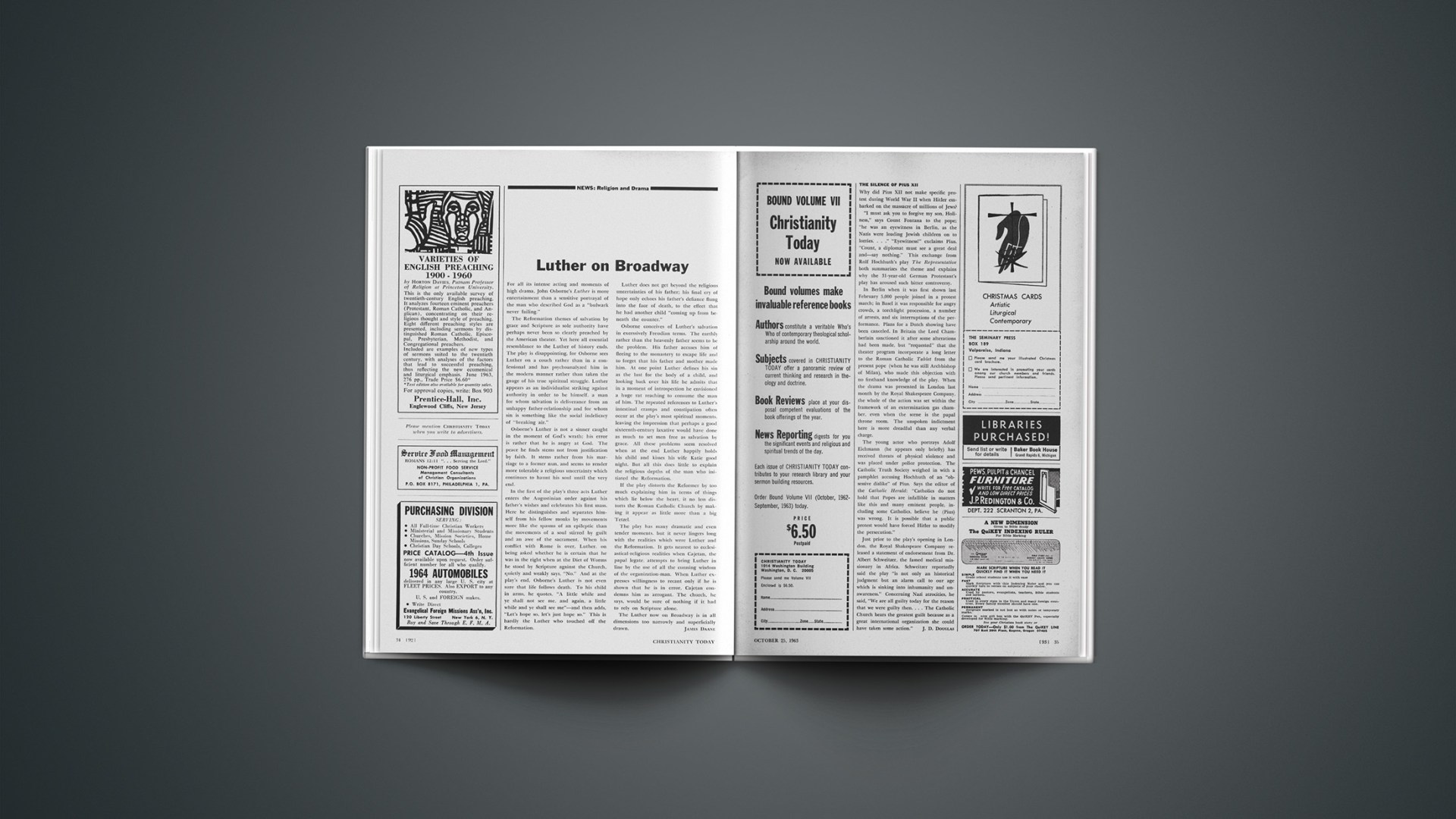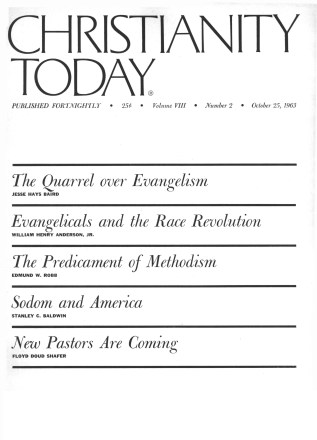For all its intense acting and moments of high drama, John Osborne’s Luther is more entertainment than a sensitive portrayal of the man who described God as a “bulwark never failing.”
The Reformation themes of salvation by grace and Scripture as sole authority have perhaps never been so clearly preached by the American theater. Yet here all essential resemblance to the Luther of history ends. The play is disappointing, for Osborne sees Luther on a couch rather than in a confessional and has psychoanalyzed him in the modern manner rather than taken the gauge of his true spiritual struggle. Luther appears as an individualist striking against authority in order to be himself, a man for whom salvation is deliverance from an unhappy father-relationship and for whom sin is something like the social indelicacy of “breaking air.”
Osborne’s Luther is not a sinner caught in the moment of God’s wrath; his error is rather that he is angry at God. The peace he finds stems not from justification by faith. It stems rather from his marriage to a former nun, and seems to render more tolerable a religious uncertainty which continues to haunt his soul until the very end.
In the first of the play’s three acts Luther enters the Augustinian order against his father’s wishes and celebrates his first mass. Here he distinguishes and separates himself from his fellow monks by movements more like the spasms of an epileptic than the movements of a soul stirred by guilt and an awe of the sacrament. When his conflict with Rome is over, Luther, on being asked whether he is certain that he was in the right when at the Diet of Worms he stood by Scripture against the Church, quietly and weakly says, “No.” And at the play’s end. Osborne’s Luther is not even sure that life follows death. To his child in arms, he quotes. “A little while and ye shall not see me, and again, a little while and ye shall see me”—and then adds, “Let’s hope so, let’s just hope so.” This is hardly the Luther who touched off the Reformation.
Luther does not get beyond the religious uncertainties of his father; his final cry of hope only echoes his father’s defiance flung into the face of death, to the effect that he had another child “coming up from beneath the counter.”
Osborne conceives of Luther’s salvation in excessively Freudian terms. The earthly rather than the heavenly father seems to be the problem. His father accuses him of fleeing to the monastery to escape life and to forget that his father and mother made him. At one point Luther defines his sin as the lust for the body of a child, and looking back over his life he admits that in a moment of introspection he envisioned a huge rat reaching to consume the man of him. The repeated references to Luther’s intestinal cramps and constipation often occur at the play’s most spiritual moments, leaving the impression that perhaps a good sixteenth-century laxative would have done as much to set men free as salvation by grace. All these problems seem resolved when at the end Luther happily holds his child and kisses his wife Katie good night. But all this does little to explain the religious depths of the man who initiated the Reformation.
If the play distorts the Reformer by too much explaining him in terms of things which lie below the heart, it no less distorts the Roman Catholic Church by making it appear as little more than a big Tetzel.
The play has many dramatic and even tender moments, but it never lingers long with the realities which were Luther and the Reformation. It gets nearest to ecclesiastical-religious realities when Cajetan, the papal legate, attempts to bring Luther in line by the use of all the cunning wisdom of the organization-man. When Luther expresses willingness to recant only if he is shown that he is in error, Cajetan condemns him as arrogant. The church, he says, would be sure of nothing if it had to rely on Scripture alone.
The Luther now on Broadway is in all dimensions too narrowly and superficially drawn.
The Silence Of Pius Xii
Why did Pius XII not make specific protest during World War II when Hitler embarked on the massacre of millions of Jews?
“I must ask you to forgive my son, Holiness,” says Count Fontana to the pope; “he was an eyewitness in Berlin, as the Nazis were loading Jewish children on to lorries.…” “Eyewitness!” exclaims Pius. “Count, a diplomat must see a great deal and—say nothing.” This exchange from Rolf Hochhuth’s play The Representative both summarizes the theme and explains why the 31-year-old German Protestant’s play has aroused such bitter controversy.
In Berlin when it was first shown last February 5,000 people joined in a protest march; in Basel it was responsible for angry crowds, a torchlight procession, a number of arrests, and six interruptions of the performance. Plans for a Dutch showing have been canceled. In Britain the Lord Chamberlain sanctioned it after some alterations had been made, but “requested” that the theater program incorporate a long letter to the Roman Catholic Tablet from the present pope (when he was still Archbishop of Milan), who made this objection with no firsthand knowledge of the play. When the drama was presented in London last month by the Royal Shakespeare Company, the whole of the action was set within the framework of an extermination gas chamber, even when the scene is the papal throne room. The unspoken indictment here is more dreadful than any verbal charge.
The young actor who portrays Adolf Eichmann (he appears only briefly) has received threats of physical violence and was placed under police protection. The Catholic Truth Society weighed in with a pamphlet accusing Hochhuth of an “obsessive dislike” of Pius. Says the editor of the Catholic Herald: “Catholics do not hold that Popes are infallible in matters like this and many eminent people, including some Catholics, believe he (Pius) was wrong. It is possible that a public protest would have forced Hitler to modify the persecution.”
Just prior to the play’s opening in London, the Royal Shakespeare Company released a statement of endorsement from Dr. Albert Schweitzer, the famed medical missionary in Africa. Schweitzer reportedly said the play “is not only an historical judgment but an alarm call to our age which is sinking into inhumanity and unawareness.” Concerning Nazi atrocities, he said, “We are all guilty today for the reason that we were guilty then.… The Catholic Church bears the greatest guilt because as a great international organization she could have taken some action.”
J. D. DOUGLAS








